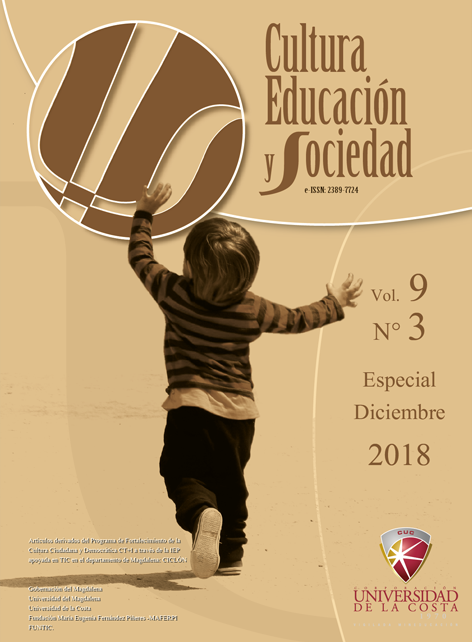Solid waste management; Entrepreneurship strategy for students of the Algarrobo District Educational Institution.
DOI:
https://doi.org/10.17981/cultedusoc.9.3.2018.98Keywords:
Solid waste management, entrepreneurship strategies, recycling in basic educationAbstract
The management of solid waste leads to the recycling of materials discarded by humans, to protect the environment. This project seeks to create an entrepreneurship strategy aimed at preschool and elementary school students of the District Educational Institution of Algarrobo. This study is of qualitative type using the participatory action research methodology, where the population was made up of students from the IED Algarrobo. Interviews were conducted with the students to identify the needs of each location. The topic to be developed with the members of the educational community was socialized. To collect the data, individual, institutional and field diaries were used. The strategy of training students in the management of solid waste was implemented, through craft workshops in recycled material, as a strategy of entrepreneurship generating a source of income for the student and his family.
Downloads
References
Badillo, M. (2012). Política de educación ambiental en Colombia, 2002-2010. Revista De Investigación Agraria Y Ambiental, 3(1), 89. Recuperado de: http://dx.doi.org/10.22490/21456453.948
Báez y Pérez de Tudela, J. (2009). Investigación cualitativa. Madrid, España: ESIC Editorial.
Bonilla García, D. (2016). El Reciclaje como Estrategia Didáctica para la Conservación Ambiental (Proyecto en ejecución). Revista Scientific, 1(1), 36-52. Recuperado de: http://dx.doi.org/10.29394/scientific.issn.2542-2987.2016.1.1.3.36-52
Hernández, R., Fernández, C., y Baptista, P. (2014). Metodología de la investigación. México, D.F.: McGraw-Hill Education. (No está citado en el texto)
Inforeciclaje. (2018). El portal con información sobre el reciclaje. Inforeciclaje.com. Retrieved 13
March 2018. Recuperado de: http://www.inforeciclaje.com/residuos-solidos.php
Mejía, M. y Manjarrés, M. (2011). La investigación como estrategia pedagógica una apuesta por construir pedagogías críticas en el siglo xxi. Praxis & Saber, 2(4), 127. Recuperado de: http://dx.doi.org/10.19053/22160159.1127
Ministerio de Educación Nacional (2018). Ley 115 febrero de 1994. Fines de la educación.
Retrieved 13 March. Recuperado de: https://www.mineducacion. gov.co/1621/articles-85906_archivo_pdf.pdf
Morgado Gamero W.B., Ramírez M.C., Parody A., Viloria A., López M.H.A., Kamatkar S.J. (2018) Concentrations and Size Distributions of Fungal Bioaerosols in a Municipal Landfill. In: Tan Y., Shi Y., Tang Q. (eds) Data Mining and Big Data. DMBD 2018. Lecture Notes in Computer Science, vol 10943. Springer, Cham
Pereira, M. (2016). Hacia la construcción de un derecho energético ambiental como disciplina autónoma. Jurídicas CUC, 12(1), 177-204. DOI: http://dx.doi.org/10.17981/juridcuc.12.1.2016.10
Pérez, G. (2002). Investigación cualitativa. Retos e interrogantes. II técnicas y análisis de datos. Madrid: la Muralla S.A. No está citado en el texto.
Reciclaje de plástico (2018). Retrieved 7 March 2018. Recuperado de: https://reciclajedeplasticoentamulte.wordpress.com/2015/05/21/justificacion-2/
Schutter, A. (1987). Método y proceso de la investigación participativa en la capacitación rural. Patzcuaro, Michoacan: CREFAL.
Vaquiro, William. (2018). La mejor solución es el reciclaje. Retrieved 7 March. Recuperado de: http://es.calameo.com/read/000851537e40d156f5307
Downloads
Published
How to Cite
Issue
Section
License
Copyright (c) 2018 CULTURA EDUCACIÓN Y SOCIEDAD

This work is licensed under a Creative Commons Attribution-NonCommercial-NoDerivatives 4.0 International License.
![]()
Creative Commons 2020 CULTURA EDUCACIÓN Y SOCIEDAD
This article is under international license Creative Commons Reconocimiento-NoComercial-SinObrasDerivadas 4.0.
The published articles are the sole responsibility of their authors and do not necessarily reflect the opinions of the editorial committee.
CULTURA EDUCACIÓN Y SOCIEDAD respects the moral rights of its authors, who assign to the editorial committee the patrimonial rights of the published material. In turn, the authors inform that this work is unpublished and has not been previously published.
All articles are under a:
Licencia Creative Commons Atribución-NoComercial-SinDerivadas 4.0 Internacional.
![]()


 English
English
 Español (España)
Español (España)




_12.53_.27_p_. m_._3.png)





_12.57_.35_p_. m_._3.png)
_12.50_.37_p_. m_._3.png)



